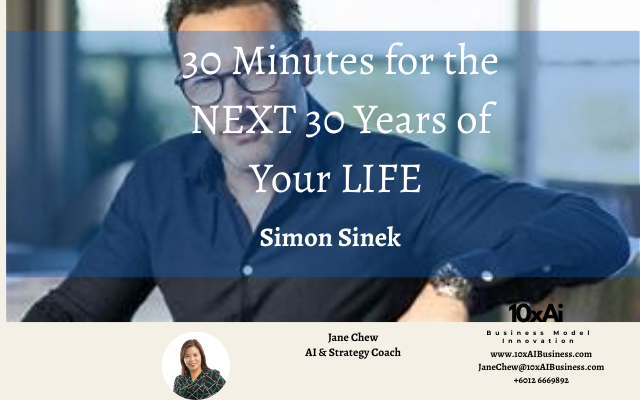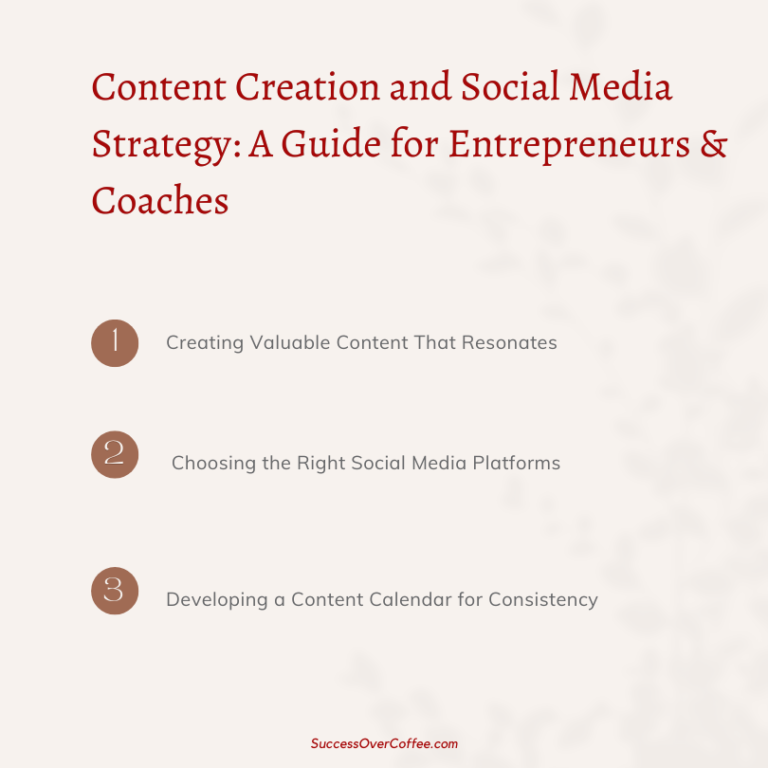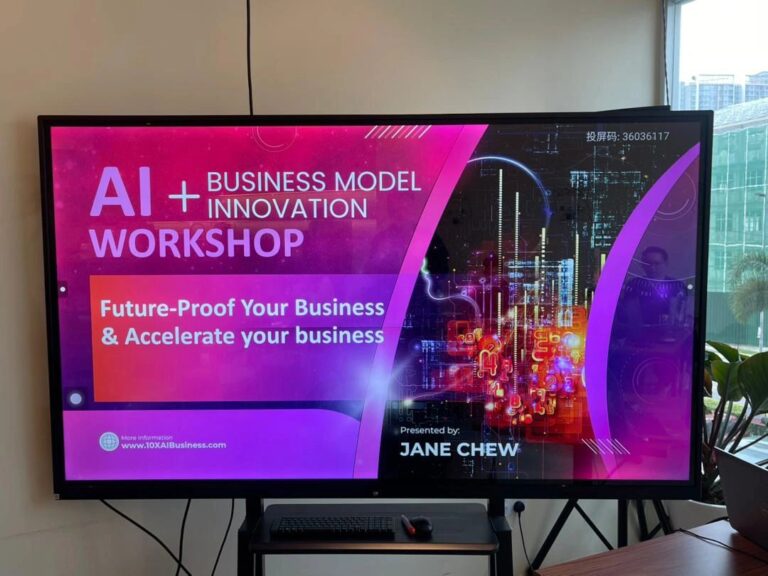Simon Sinek: 30 Minutes for the NEXT 30 Years of Your LIFE (Full Transcript)
Executive Summary
In this talk, Simon Sinek shows how choices you make in the next 30 minutes—how you ask for help, listen to understand, frame messages for the giver, and prioritize momentum over markers—can shape the next 30 years. He explains why courage is social, why healthy cultures normalize reversible “falls,” and how balancing dopamine with purpose and relationships sustains performance.
Pull Quote: “We don’t build trust by offering help—we build trust by asking for it.” — Simon Sinek
Key Takeaways
- Make it about the giver: Audience-centric framing (“If you only give once a month… think of me next time”) outperforms me-centric appeals.
- Ask for help: Vulnerability creates safety; it’s the fastest trust-builder.
- Human connection pays: Shared identity and service (e.g., rescuing a rival) produce deep fulfillment.
- Emotional professionalism: Be human at work without being messy—own your state and stay respectful.
- Measure momentum: Track direction and compounding ease, not just promotions or pay.
- Encourage “falls”: Design low-stakes experiments; judge recovery speed, avoid catastrophes.
- Balance dopamine: Tangible goals motivate, but over-reliance (metrics, pings) breeds addiction.
- Courage is social: Strong relationships are the “net” that enables bold action.
- Trust happens between meetings: Micro-check-ins, work buddies, quick calls—little things compound.
Core Themes
Giving & Messaging: People give when messages honor their constraints and agency—not when we broadcast our needs.
Listening to Understand: Make others feel heard; agreement isn’t required to show respect and reduce fear.
Success → Momentum: Replace fuzzy “success” with observable momentum—speed, direction, and compounding effects.
Dopamine & Discipline: Write tangible goals and limit addictive triggers to keep progress healthy.
Innovation via Falling: Frequent, reversible misses build muscle; catastrophes sap courage.
Social Courage: Teams act bravely when they know others will catch them.
FAQs
How do I apply this in 30 minutes?
Write one tangible 90-day goal, ask one person for help today, and book two 10-minute “how are you?” check-ins this week.
What’s a practical “fall” example?
Ship a draft to five users, not 5,000. If it “falls,” learn and iterate—no catastrophe.
How can leaders model humanity without oversharing?
Say, “I’m a bit off today; here’s what I need from you,” then keep standards high and conversations respectful.
Full Transcript
Show/Hide Transcript
The Experiment with Giving
I did a little experiment with a homeless person. Not like on them, it’s not like electrodes. With them, voluntarily helped me. Because the whole idea of giving, right?
You’ve all walked down the street and you’ve all seen someone begging and you either have or haven’t thrown a few pennies in their cup. When you do, you feel good. You bought that feeling. That is a legitimate commercial transaction.
Commercial transactions are defined as the exchange of consideration. There was an exchange of consideration here. You gave money, you got the feeling of goodwill. You paid for that feeling.
If you didn’t give money, you either feel nothing or you feel bad. You can’t feel good by not giving. You paid for that feeling. So now the question is, how is that person encouraging us to give?
The Corporate Approach to Begging
The joke is, they act like every corporation in the world. They talk about themselves. Me, me, me, me, me… Little sign: “I’m homeless, I’m hungry, I’ve got 12 kids, I’m a veteran, God bless.”
What do corporations do? “We’ve added more RAM, more speed. We’re number one. We’re better than them.” Even if we buy, we don’t feel much.
The Revolutionary Sign
Her original sign earned $20–$30 a day. I changed it; she made $40 in two hours. The sign said: “If you only give once a month, please think of me next time.”
Make it about the giver. Address objections: “I can’t give to everyone,” “Do they really need it?” $40 in two hours—because the framing respected the giver.
The Importance of Understanding People
100% of customers, clients, and employees are people. If you don’t understand people, you don’t understand business. Our survival depends on trusting relationships.
The Deadliest Catch: A Lesson in Human Connection
Huge storm. A rival crew films “man overboard.” They turn, pull him from near-freezing water, save his life. The captain hugs a competitor like a son. Fulfillment comes from shared identity and service.
The Power of Helping Others
What are you doing to help the person next to you? Alone we’re limited; together we’re remarkable.
The Importance of Asking for Help
Asking for help is perhaps the greatest skill—especially when contexts are new and stresses high. I once ran my firm on force of personality until it broke; asking for help transformed everything.
We build trust by asking for help. It’s vulnerability that lets others offer protection. Listening means making others feel heard—not just hearing words.
The Art of Listening
Let people tell their story without fixing or judging. One example: a friend wary of new tech; I listened, affirmed fears, offered facts. Feeling heard opened the door to her own choice.
Emotional Professionalism in the Workplace
Be human at work: “I’m a little off today,” but don’t withdraw or lash out. Vulnerability is: “I don’t know,” “I need help,” “I’m overwhelmed.” This strengthens—not weakens—careers.
The Power of Asking for Help (again)
When leaders ask for help, people step up. Leadership isn’t being better at others’ jobs; it’s ensuring they have tools, training, and psychological safety to be their best.
Defining Success
Success is fuzzy if you can’t measure it. I’m building a world where most people end days fulfilled—so I track progress, not a finish line.
Measuring Momentum
Measure momentum over markers. Keep the ball rolling so compounding takes over. When it can run without you, you’ve succeeded—even if that’s beyond your lifetime.
Understanding Dopamine
Dopamine is the feeling of finding what you seek or achieving a goal. Tangible, visible goals keep us focused because we’re highly visual animals.
The Dopamine Addiction
Dopamine is highly addictive (alcohol, nicotine, gambling, phones). Metrics-only cultures and constant pings feed it and can damage relationships and judgment.
The Importance of Failure in Innovation
You cannot innovate without setbacks. Avoid catastrophic failure but encourage falling—small, reversible misses—and judge how fast teams stand back up.
The External Nature of Courage
Courage is social: we jump because there’s a parachute, a net, a teammate. Elite teams endure because, when empty, they still find the energy to help the person next to them.
Building Trust in the Workplace
Trust happens between the notes—between meetings. Micro-interactions, work buddies, Monday huddles (no business), Friday socials, and simple “How are you?” calls build resilient culture.
Leaders must normalize asking for help and create clear paths to connection before anything breaks.


